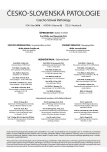-
Články
- Vzdělávání
- Časopisy
Top články
Nové číslo
- Témata
- Kongresy
- Videa
- Podcasty
Nové podcasty
Reklama- Kariéra
Doporučené pozice
Reklama- Praxe
Published in the journal: Čes.-slov. Patol., 52, 2016, No. 2, p. 68
Category: Interview
MUDr. Ayotunde Folakemi (Sobande) Torgersen, Ph.D. se narodila v roce 1983 v Londýně. Ačkoli původně studovala biochemii v Nigérii, nakonec vystudovala medicínu na lékařské fakultě UK v Hradci Králové. Hradci Králové zůstala věrná a po ukončení studia nastoupila do tamního Fingerlandova ústavu patologie. Dvakrát se zúčastnila výzkumných stáží v USA, a to na Mayo Clinic v Rochesteru. V roce 2014 úspěšně dokončila postgraduální stadium ve studijním programu Patologická anatomie. Hlavním odborným zájmem paní doktory je patologie mléčné žlázy. A této oblasti se týkala i práce, kterou publikovala v našem časopise v minulém roce a která se stala po hlasování členů redakční rady vítěznou v soutěži o Bednářovu cenu za rok 2015.
This year, you became a winner of the Bednář Award for best publication of our journal in the last year. Although our readers surely read the awarded paper, could you please briefly summarize it?
We did a retrospective study on women with triple negative breast cancer (TNBC) diagnosed and treated in our hospital. We compared patient outcome to tumor characteristics, particularly EGFR expression as EGFR was being pushed as a potential molecule for targeted therapy. EGFR changes did not appear to be associated with aggressive behavior. This raises questions about the suitability of anti-EGFR therapy for TNBC.
I wonder, what was your journey to the Czech Republic, to Hradec Králové like?
I came to Hradec in 2002 to study medicine. I studied in the English program. A friend of my sister´s had moved to Prague from London to study medicine and that´s how my family got to know about this possibility. At the time I was studying biochemistry in Nigeria but my parents were encouraging me to study medicine and I thought it sounded like a great adventure to move to a completely unknown place. Also, the photos in the university brochure looked quite nice.
And how did you become a pathologist?
I enjoyed medical school in general so it did not matter so much to me which speciality I ended up with. I was particularly inspired by prof. Steiner who taught me in my third year. He´s a fantastic educator. I went to see him shortly after graduation and here I am. I’ve enjoyed learning and working at our department. I guess I got lucky.
What is your field of expertise in pathology?
I`m most comfortable with breast pathology as that is what I studied for my PhD. After I passed my board exams just over a year ago my boss, Ales Ryska, suggested I take up genitourinary pathology. So far so good ϑ. I’m hopefully gathering the right tools to one day be an expert in these areas.
How do you perceive the latest progress of modern pathology? How do you see the future of pathology?
At the moment we’re hearing a lot about gene expression and molecular classification in malignancy. The new information is essential but I think we may be a bit hasty to put fresh data out there and try to use it outside research settings. I hope that morphology will continue to play a central role in our daily practice.
What are your personal and professional expectations for the future?
I hope to get better at doing my job. I´d eventually like to get more involved in teaching and training pathology residents. I’d like to see more of the world, raise a strong and happy family and maybe one day own a farm. It would be nice to do something to improve the healthcare situation in Nigeria. At the moment, I have no idea what that could mean for me personally but it’s something for the future.
And what do you do when not working?
I enjoy anything that has to do with good food. I also enjoy a good jog outdoors every now and then. I spend most of my free time with my husband. We attend and volunteer at a local church and work with the international community there. Right now we´re trying to prepare for the arrival of our first child and all the changes it will bring.
Štítky
Patologie Soudní lékařství Toxikologie
Článek vyšel v časopiseČesko-slovenská patologie

2016 Číslo 2-
Všechny články tohoto čísla
- Interstitial lung diseases associated with smoking
- Stručne o kongrese digitálnej patológie v Londýne
- Jaká je Vaše diagnóza?
- Non-traumatic arteriovenous malformation of the spleen with fatal hemorrhage
- Vzpomínka na prof. MUDr. Dagmar Kalouskovou, Ph.D.
- Jaká je Vaše diagnóza? Odpověď
- Meningothelial hamartoma of the scalp. A case report
- Prof. MUDr. Aleš Rejthar, CSc. (1938 – 2015)
- Intersticiální plicní procesy
- MONITOR aneb nemělo by vám uniknout, že
- Histopathology of interstitial lung diseases
- Idiopatic pulmonary fibrosis – news in multidisciplinary diagnostic and therapeutic approaches
- Differential diagnosis of granulomatous lung diseases
- Česko-slovenská patologie
- Archiv čísel
- Aktuální číslo
- Informace o časopisu
Nejčtenější v tomto čísle- Differential diagnosis of granulomatous lung diseases
- Interstitial lung diseases associated with smoking
- Idiopatic pulmonary fibrosis – news in multidisciplinary diagnostic and therapeutic approaches
- Histopathology of interstitial lung diseases
Kurzy
Zvyšte si kvalifikaci online z pohodlí domova
Autoři: prof. MUDr. Vladimír Palička, CSc., Dr.h.c., doc. MUDr. Václav Vyskočil, Ph.D., MUDr. Petr Kasalický, CSc., MUDr. Jan Rosa, Ing. Pavel Havlík, Ing. Jan Adam, Hana Hejnová, DiS., Jana Křenková
Autoři: MUDr. Irena Krčmová, CSc.
Autoři: MDDr. Eleonóra Ivančová, PhD., MHA
Autoři: prof. MUDr. Eva Kubala Havrdová, DrSc.
Všechny kurzyPřihlášení#ADS_BOTTOM_SCRIPTS#Zapomenuté hesloZadejte e-mailovou adresu, se kterou jste vytvářel(a) účet, budou Vám na ni zaslány informace k nastavení nového hesla.
- Vzdělávání




